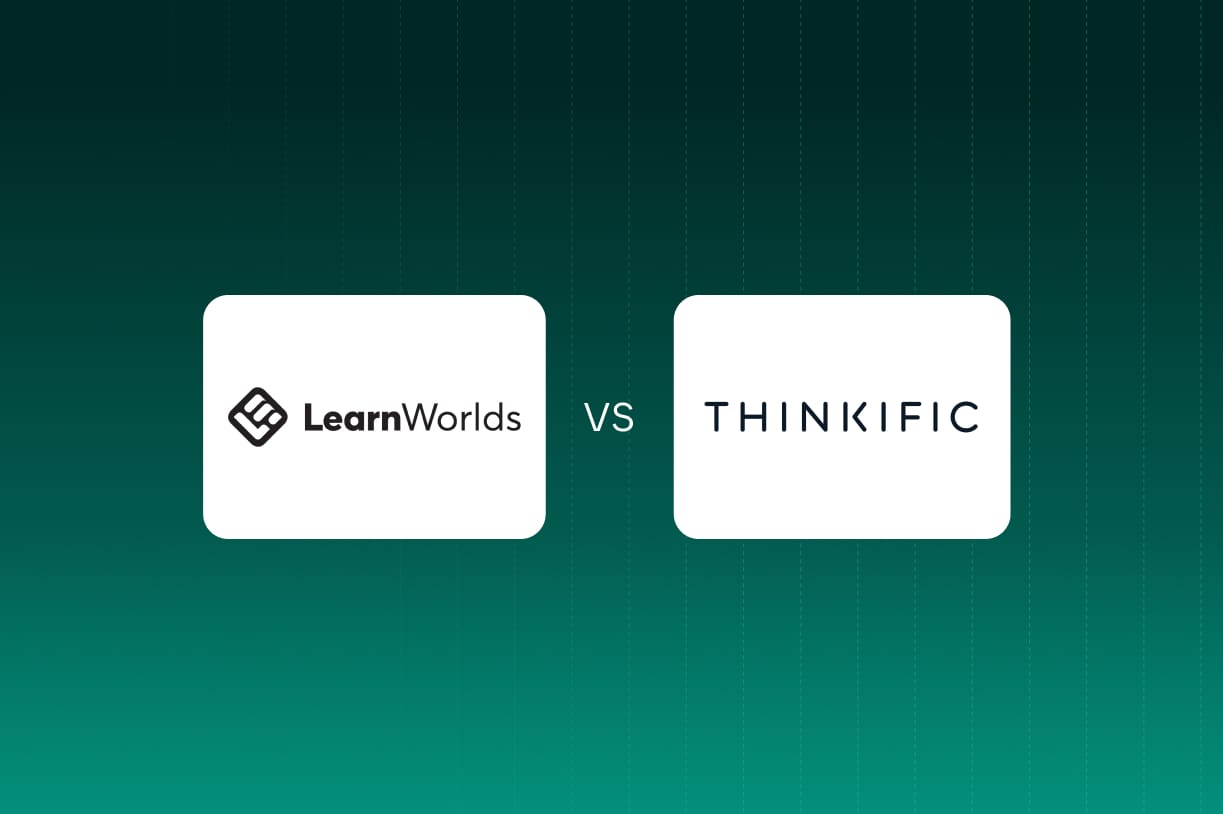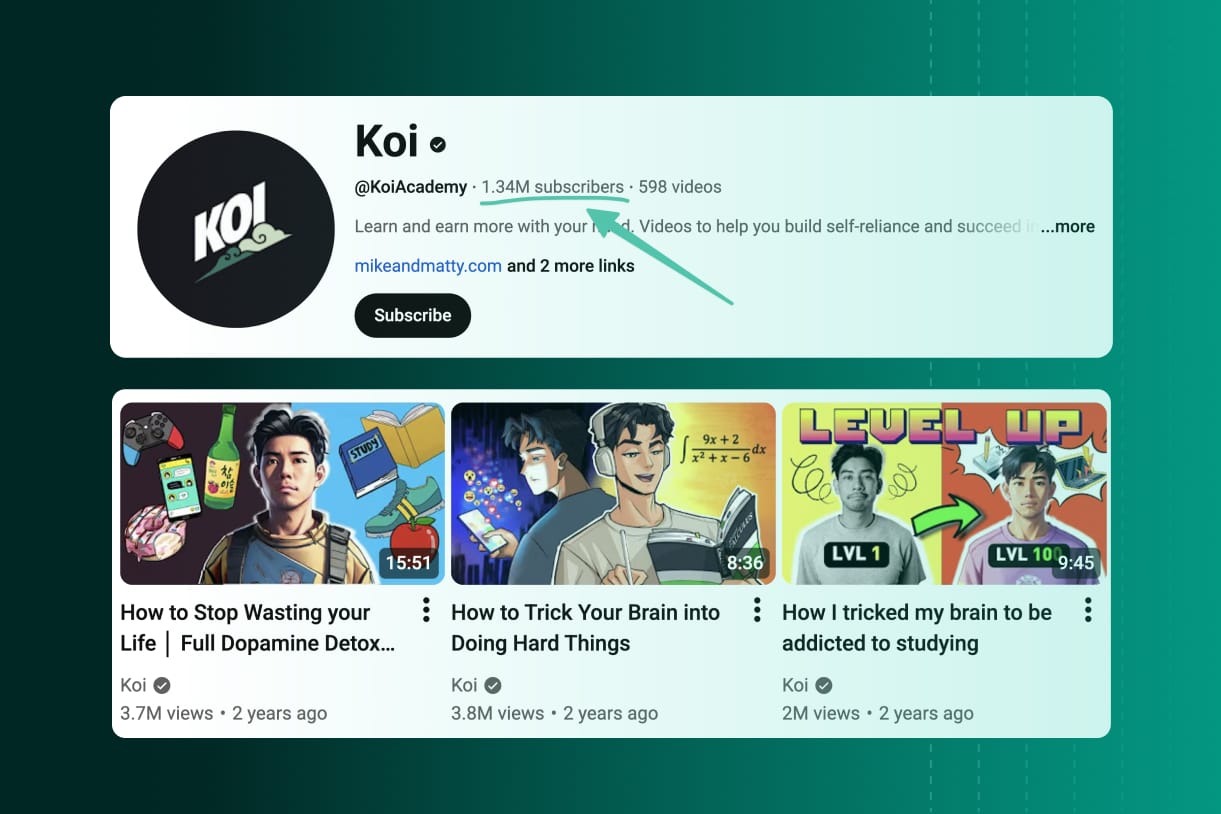How to find your perfect niche — The no-fluff guide that actually works
Unlock the secret to a thriving online business by mastering the art of niche selection. Dive into this powerful guide to choose your perfect niche.

There are an infinite number of ways to enter the creator economy and thrive with a successful online business. But carefully considering exactly what you want to do and deciding specifically who you want to do it for are the foundation of a successful digital business model. Before choosing your own point of entry to this world opportunity, use this guide to create a niche to help ensure you choose the right fit for you and your customer base!
Finding niche markets is easier said than done
“Find your niche!” You've heard it a thousand times and it's supposed to be the golden rule of building a successful business, a thriving personal brand or even just a fulfilling career. It’s definitely a must for those starting a business based on digital products.
But for most people, this advice feels like a frustrating challenge. They try to pick a target market, narrow down their services or specialize in a specific skill, only to feel constrained, uninspired or like they're missing out on opportunities. The truth is that most conventional niche advice doesn’t work because it focuses too much on external factors and not enough on the most crucial element — you.
What is a niche?

For our purposes here, a "niche" isn't just a segment of the market you want to serve. It's something far more personal and powerful. Your perfect niche is the unique and dynamic intersection of three core elements:
- Your skills: What are you good at? What knowledge, talents and experience do you possess?
- Your interests/passions: What genuinely excites you? What topics could you talk about for hours without getting bored? What problems do you really care about solving?
- Audience needs: What specific challenges, desires or gaps exist in the market that you are uniquely positioned to address?
At the point where these three meet, you don't just find a market, you discover your unique contribution, a place where your work feels effortless, impactful and rewarding. That’s your niche.
Defining your personal premise
Want to find your niche? First, be clear on the answers to these questions and how they influence your purpose:
[fs-toc-omit]Who do you help and how?
This question forces you to be specific about the value you provide. It's not enough to say, "I help businesses." Be specific. Think about the transformation you facilitate.
Use these prompts on yourself:
- "I help [type of person] achieve [result] by [method].
Example: "I help busy small business owners achieve financial clarity and peace of mind by simplifying their bookkeeping and tax preparation."
- "My ideal client is struggling with [specific problem] and wants to [specific desired outcome]."
Example: “My ideal client is struggling with graphic design and wants to look more professional.”
- "What kind of person or organization truly benefits most from what you offer?"
Example: “Anyone who wants to start learn the basics of meditation will benefit from my help.”
[fs-toc-omit]What is your unique perspective?
Everyone has a unique lens through which they see the world and their chosen field. This perspective can be a powerful differentiator. It's not just what you do, but how you do it and why you approach it the way you do.
Guiding questions & examples:
- "What do you wish everyone understood about your topic that they currently don't?”
Example: "As a personal trainer, I wish everyone understood that sustainable fitness isn't about punishing your body, but about nourishing it with real food and healthy routines."
- "What common advice in your industry do you disagree with, and why?"
Example: “As a tax accountant, I have a different approach to managing risk.”
- "What unconventional wisdom do you hold about your field?"
Example: “My training as a dietitian in Asia has given me different insights into meal preparation.”
[fs-toc-omit]Why does your work need to exist?
This is the deepest dive. It's about your mission, your purpose beyond profit or personal gain. What gap are you filling in the world? What problem is so compelling that it drives you to do what you do?
Clarify your mission:
- "What specific problem in the world or in your industry would go unsolved if you didn't do this work?"
- "Why you, and why now?"
- "What change do you want to see in the world as a direct result of your work?"
- "What core belief drives your commitment to this area?"
Choosing a niche is better than finding one
The language we use shapes our perception. The focus is usually on how to find your niche or how to find your niche market but this word can be misleading and take the initiative away from you. A small change to choosing your niche products or services and choosing the target audience that will appreciate them can change the dynamic in significant ways.
[fs-toc-omit]Why not find your niche?
"Finding" suggests that your perfect niche is like a treasure map, something waiting to be discovered, something that you might stumble upon if you’re lucky. This can lead to endless searching, analysis paralysis and the feeling that if you haven't "found" it yet, you're doing something wrong.
It also means that too many people believe that if they haven’t “found” their niche yet, it just means they should keep looking (and looking…).
"Choosing," on the other hand, frames niche selection and the business idea that comes with it as an active, empowering process. It acknowledges that you are in control. You are not merely uncovering something — you are creating it. You are making deliberate decisions based on your insights, passions and the needs you identify. This shift in mindset from passive discovery to active creation is fundamental to building a sustainable and fulfilling niche. You aren't just looking for a gap, you are deciding where you want to make your unique mark.
[fs-toc-omit]The problem with going too narrow
While the advice to "niche down" is often given, taking it too literally can lead to significant pitfalls. Over-specialization can feel restrictive and be unsustainable.
Quick examples:
- Is your dream to be "a personal chef who makes Tibetan cuisine for wealthy families in Houston, Texas"? Even though that’s very specific, this niche might quickly run out of potential clients, making growth difficult and limiting creative expression.
- Are you a content writer specializing only in "blockchain technology for independent coffee shops"? You might quickly exhaust all there is to say on the topic, or find that the market for such specific content is too small to support a full-time business.
- A business advisor who helps only "first-time female entrepreneurs opening a bakery" will find it nearly impossible to find enough clients to sustain your practice.
You get the idea. Going too narrow risks limiting your audience, stifling your creativity and making your business vulnerable to shifts in a tiny market segment. It can also lead to burnout from repetitive tasks and a lack of intellectual stimulation.
[fs-toc-omit]Think in terms of purpose, not just market
The most resilient and rewarding niches are built on purpose, not just market opportunity. While profitability is important, a niche rooted only in what's popular now or what seems lucrative often lacks the motivation needed for long-term success.
When you focus on your purpose—the deeper "why" behind your work, as explored in the previous section—you tap into a sustainable source of energy. This means:
- You're driven by impact. You're not just chasing trends, you're solving problems you genuinely care about.
- Your work feels meaningful. It aligns with your values and passions, making challenges less troublesome and more like opportunities for growth.
- You attract aligned clients. People who resonate with your purpose will be drawn to you, leading to more fulfilling client relationships.
- You have longevity. Your niche can evolve as you do, because it's based on an enduring mission rather than a fleeting market segment.
Pick a niche where your unique contribution can develop, fueled by your purpose, and where you can sustainably serve a community that truly needs what you offer.
Align your specific niche with experience and curiosity
Your most powerful assets in defining your niche are often already within you — your past experiences and your innate curiosity. Nobody else can replicate this unique selling point and leveraging the advantages you bring to the table can lead to a niche that feels authentic, sustainable and rewarding.
[fs-toc-omit]Use earned insight to your advantage
Every challenge you've overcome, every skill you've acquired and every lesson you've learned contributes to a unique body of "earned insight." This isn't just about formal qualifications, although those definitely count, it's about the wisdom gained from living and doing.
- Leverage experience and gained skills. Think about the specific problems you've personally solved, or the areas where you've consistently excelled. What practical knowledge have you accumulated that others might lack? This could be anything from navigating a career change, mastering complex software, raising a family while building a business, overcoming personal struggles or a million other things. These experiences are the foundation of your unique expertise.
[fs-toc-omit]Create for your past self or future self
One of the most powerful ways to define a rewarding niche is to use your own journey as a blueprint for what you create. This approach taps into genuine empathy and understanding, making your work deeply relatable to others.
- Think about your past self. What problems did you struggle with in the past that you've now overcome? What information, support or solutions did you need but couldn't find? By creating for your past self, you become the guide you wished you had.
- Think about your future self. What do you aspire to achieve or become? What skills do you want to master, or what impact do you want to make? By creating content or services aligned with your future goals, you not only define a niche but also build a path for your own growth.
[fs-toc-omit]Let curiosity guide your learning path
While market research and strategic planning are important, never underestimate the power of genuine curiosity. What topics, questions or problems genuinely fascinate you, even if they don't immediately seem "profitable"?
- Prioritize your own curiosity over what’s trending. True curiosity is a sustainable fuel. It drives you to dig deeper, experiment and learn continuously, which is essential for long-term relevance in any field. When you're genuinely interested, learning feels less like work and more like play, allowing you to develop unique insights and approaches that can't be easily replicated. This passion will shine through your work and attract an audience that shares your enthusiasm.
Pick a niche market using a validation matrix
Let’s apply what we’ve covered so far into a practical framework for visualizing how any ideas you might have compare to each other and which truly stand out as being aligned with what will make you happiest.
Let’s say you have three niche ideas:
- Teaching beginner guitar online
- Helping remote workers prevent burnout
- Guiding new dog owners through puppy training
You want to evaluate which is the best to pursue with your current skills, interests and market opportunities. Here’s how the matrix might look:

Scoring:
- High = 3, Medium = 2, Low = 1
Now, total each column:
- Guitar Lessons: 3 + 3 + 2 + 2 + 3 = 13
- Remote Burnout: 2 + 2 + 1 + 3 + 1 = 9
- Puppy Training: 3 + 1 + 2 + 2 + 2 = 10
Interpretation:
- “Teaching beginner guitar online” scores highest. You have expertise, motivation and there’s strong demand (even if competition is moderate).
- “Puppy training” looks good in terms of demand, but you lack expertise, so you would need to learn a lot first.
- “Burnout prevention” may have sustainability, but you’re less excited and it’s a crowded space.
Next step:
Pick “beginner guitar online” as your primary focus. But before committing fully, run a quick audience test:
- Survey a few potential learners
- Post a free lesson and see engagement
- Research what paid courses/books are selling
Managing niche market anxiety
It's common to feel a sense of anxiety when trying to define your niche. Even after making your choice, there can still be a voice in your head wondering if you’ve chosen the right direction. Fears about limiting yourself, missing opportunities or not being "expert enough" can creep in. These anxieties often stem from misconceptions about what a niche truly is and how it functions.
[fs-toc-omit]Overcoming fear of missing out on opportunities
The fear of missing out (FOMO) on potential clients or broader opportunities is a significant hurdle for many. You might worry that by focusing on one group, you're closing doors on others. However, the opposite is true — focus creates opportunities.
When you commit to a specific niche, you:
- Establish credibility. You become known for something specific, positioning yourself as an authority rather than a generalist. This makes you the go-to person for a particular problem.
- Build trust. Clients are more likely to trust someone who deeply understands their specific challenges and has a proven track record in that area. This trust leads to referrals and repeat business.
- Attract ideal clients. Instead of vaguely appealing to everyone, you clearly signal who you serve, attracting clients who are a perfect fit for your expertise, leading to more satisfying work and better results.
- Streamline your marketing. With a clear niche, your messaging becomes sharper, your content more targeted and your marketing efforts more efficient. You know exactly who you're talking to and what they need to hear.
Focus isn't about limitation, it's about leverage. It allows you to use your talents and serve specific needs in a way that ultimately unlocks more meaningful opportunities.
[fs-toc-omit]Why being specific attracts more people, not fewer
This is perhaps the biggest myth to debunk: the idea that narrowing your focus will shrink your potential market. In reality, being specific often attracts more of the right people, not fewer overall.
Think of it this way. If you have a specific health issue, would you rather consult a general practitioner or a specialist who deals with that exact condition every day? You'd choose the specialist because they offer targeted expertise and a higher likelihood of solving your problem effectively.
Specificity works by:
- Increasing relevance. Your message speaks directly to the core pain points and desires of your ideal audience, making them feel seen and understood.
- Building a loyal following. When you consistently deliver value to a specific group, they become loyal advocates. They'll recommend you to others who share their needs, creating a powerful ripple effect.
- Standing out in a crowded market. In a world saturated with generalists, specificity is your competitive advantage. It makes you memorable and positions you as the clear choice for a particular need.
- Commanding higher value. Specialists are often perceived as more valuable and can command higher rates because of their focused expertise.
Don't fear market shrinkage and instead embrace market deepening. By being specific, you cultivate a highly engaged community that values your unique contribution and shows high customer loyalty.
[fs-toc-omit]Dealing with impostor syndrome in your chosen area
For many people, putting themselves forward as an expert prompts them to think, “Am I really an expert?” This is a common feeling, especially when you're stepping into a more defined role.
Here are tools for gaining confidence and reframing your expertise:
1. Share in-progress stories. Share your journey, your learning process and your "in-progress" insights. People connect with authenticity and vulnerability. Document your experiments, your failures and your breakthroughs. This not only builds trust but also positions you as a relatable guide rather than an unattainable expert.
For example, Jarod Estacio, Co-founder of Grid, set up a dedicated Instagram account to share his no-fluff founder story with the public. Check it out to see how he did it.
2. Reframing expertise. Expertise isn't about knowing everything, it's about knowing more than the person you're helping about a specific topic. You don't need three decades of experience to be valuable. Your unique perspective, your earned insights and your genuine curiosity are powerful forms of expertise. Focus on the value you can provide right now, not on a mythical level of perfection.
3. Start small, iterate and learn. Begin by serving a few ideal clients, creating small pieces of content or offering a focused service. Gather feedback, learn from the experience and iterate. Each small success builds confidence and refines your approach.
4. Connect with your "Why". When imposter syndrome strikes, revisit your personal premise and your mission. Remind yourself why your work needs to exist and the impact you aim to make. This deeper purpose can be a powerful antidote to self-doubt.
Validate and evolve your niche in business over time
Defining a niche is an ongoing process of validation, learning and adaptation. The world around your niche, the market it serves and your own needs and preferences are in constant states of change and so you will always be in catch-up mode. Your niche will naturally evolve as you grow, gain more experience and as the market shifts.
Since nothing is set in stone, make these tips part of your mindset when looking for ways to constantly update your brand identity and stay fresh.
[fs-toc-omit]Start small and test your ideas
The biggest mistake many make is trying to perfect their niche before ever putting it out into the world. Instead, embrace a lean approach and launch with minimum risk to see what resonates.
Don't build an entire empire before you know if anyone wants what you're offering. Start with a "Minimum Viable Offer" (MVO). This could be:
- Tiny offers. A small, low-cost service or product that addresses a very specific pain point for your chosen audience.
- Simple content. A series of blog posts, social media updates or a short video series exploring your niche topic and testing audience engagement.
- Test audiences. Offer a free consultation or a beta version of your service to a small group of ideal clients and gather their honest feedback. The goal is to get real-world data quickly, without significant investment of time or money.
[fs-toc-omit]Use feedback loops to improve
Once you've launched your small tests, the real learning begins. Active listening and observation are crucial for refining your niche.
Highlight the importance of gathering and acting on feedback on customer satisfaction, using surveys, real conversations or engagement metrics:
- Direct conversations. Talk to your test audience or early clients. Ask open-ended questions about their challenges, what they found most valuable and what they still need.
- Surveys. Use simple online surveys to gather quantitative and qualitative data from a broader group.
- Engagement metrics. Pay attention to what content gets the most views, shares, comments or what offers get the most inquiries. These are signals from your audience about what resonates.
- Observe behavior. Notice what problems people consistently ask you about, even outside of your formal offerings. This often points to unmet needs within your chosen area.
[fs-toc-omit]Be open to pivoting as you grow
Your interests will evolve, new skills will emerge and market needs will change. The boundaries, purpose and value in your niche should be dynamic, not rigid.
Give yourself permission to evolve the niche as new interests or opportunities arise. Don't feel locked into your initial definition.
You might discover a sub-niche within your existing one that you're even more passionate about, or a new technology emerges that allows you to serve your audience in a better way. Embrace these changes as opportunities for deeper alignment and greater impact.
[fs-toc-omit]When to commit vs. when to pivot (decision criteria)
Knowing when to double down on your current niche versus when to make a significant change can be challenging. Here are practical criteria to help you decide:
- Based on results. Are you seeing tangible results for your clients? Are you attracting enough of your ideal audience? Are your efforts translating into the desired outcomes (e.g., leads, sales, engagement)? Consistent positive results are a strong signal to commit.
- Based on enjoyment/energy. Are you still genuinely excited by the work? Does it energize you or does it feel like a constant drain? If the joy has gone, and it feels like a chore, it might be time to pivot. Monitor changes in your commitment level here.
- Based on market signals. Is the market still receptive to your niche? Are there new trends or shifts that make your current approach less relevant or new opportunities that align more closely with your evolving skills and interests?
Ultimately, your niche is a strategic choice, but it's also an organic expression of who you are and the value you bring. By validating your ideas, listening to feedback and remaining open to evolution, you can cultivate a niche that supports both your business goals and your personal fulfillment.
Niche businesses and long-term success
Finding your perfect niche isn't about fitting into a pre-defined box that you have to learn to fill. It’s more about crafting a unique space where your skills, passions and the needs of your target customers perfectly intersect. It's an active choice, not a passive discovery.
Taking your time and being deliberate about the choices you make now will help ensure that you're not just building a business or a brand — you're building a sustainable and deeply fulfilling path for yourself.
If you really want to hit the bullseye of professional satisfaction combined with personal growth and happiness, aim for a niche where your talents, skills and preferences directly connect with the needs of a particular audience. The result will be satisfaction all around and a successful, profitable niche that can grow with you.
Related articles
Ready for more? Check out these related articles that will keep your momentum going. They’re packed with easy-to-follow tips and tricks to help you supercharge your digital goods business.
Take it easy with Easytools
Focus on creating, and let Easytools handle the behind the scenes work.





